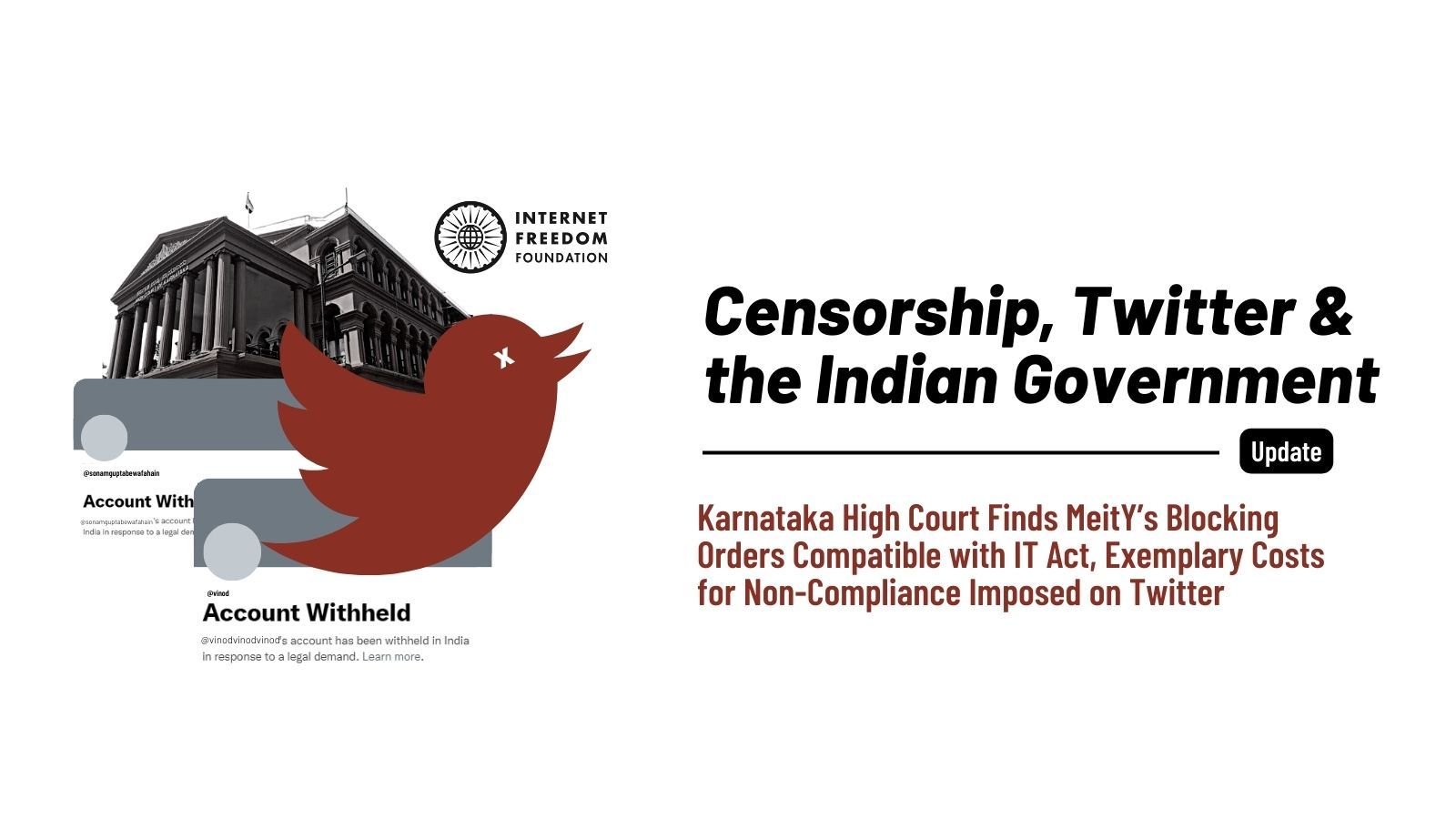
Tl;dr
On June 30, 2023, the Karnataka High Court in X Corp. v. Union of India, while dismissing Twitter Inc.’s challenge to the Blocking Orders issued by the Ministry of Electronics and Information Technology’s (“MeitY”) under Section 69A of the Information Technology Act, 2000 (“IT Act”), found MeitY’s orders to be compliant with directions in Shreya Singhal v. Union of India. With regard to proportionality and language of the statute, the HC interpreted Section 69A to include the power of blocking an entire account, as opposed to specific tweets. Further, it imposed a cost of Rs. 50 lakhs on Twitter Inc. for being wilfully non-compliant with MeitY’s orders.
Background of the Case
In 2022, Twitter filed a petition challenging the validity of content-takedown and account-blocking orders issued by MeitY, which were largely involved in the dissemination of information about the government’s performance during COVID-19 and the farmers’ protest. It submitted that the Orders were incompatible with the Supreme Court’s judgement in Shreya Singhal v. Union of India, where the SC had upheld the constitutionality of Section 69A of the IT Act and the Information Technology (Procedure and Safeguard for Blocking for Access of Information by Public) Rules, 2009 (“Blocking Rules, 2009”), on the ground that notice is required to be issued to both the intermediary as well as the originator whose content is to be taken down. [para IV(A)].
It was further contended by Twitter that the impugned Blocking Orders did not contain reasons recorded in writing and were not communicated to the affected entities, i.e. the users, which prevented the users from effectively challenging the same [pages 64-65]. Additionally, by directing for suspension of entire accounts, Twitter claimed that the directions of MeitY were disproportionate and excessive. Further, they ran contrary to the language of Section 69A of the IT Act which did not empower the Union Government to block entire accounts, but only specific tweets.
The Judgement
The HC framed eight issues for resolution. Out of these eight issues, it only found the issue of locus standi in Twitter’s favour, and on all substantive points, it ruled in favour of the Union Government.
The first issue concerned Twitter’s locus to assail Blocking Orders before a Constitutional Court in India on account of it being a foreign company. The HC affirmed the well-settled proposition that Article 226 can be invoked independent of violation of fundamental rights, and Twitter’s inability to claim Articles 19 and 21 as a “citizen” would not be fatal. The HC also noted that constitutional questions were only ancillary to Twitter’s petition, since it was “mainly urging violation (sic) of statutory rights” [page 18]. It relied on American case-law, provisions of the Code of Civil Procedure, 1908, and a vedic scripture to conclude that Twitter had the locus to assail MeitY’s Blocking Orders under Section 69A of the IT Act.
The second issue concerned Twitter’s primary legal challenge – that Section 69A of the IT Act, which permits the Union Government to block from public access “any information generated, transmitted, received, stored or hosted in any computer resource”, did not include the power to direct the blocking of an entire account, for it is “tweet-specific” [page 44]. The issue, therefore, concerned a construction of the width of Section 69A. The Court found that a narrow interpretation of the Section would “fail to effectuate the spirit & larger intent of the Parliament” [page 46]. It observed that the Section had a preventive intent, aiming to prohibit the dissemination of information in pursuance of grounds stipulated under Article 19(2), and it did not intend to merely punish the originator of a Tweet. Information that had not yet arisen but was likely to arise could, thus, also be blocked [page 61]. This meant, in sum, that no restrictions could be read into the Union Government’s powers under Section 69A, and that a Blocking Order extending to the takedown of an entire account could very well be issued by MeitY.
Third, the HC assessed the validity of MeitY’s takedown orders challenged on the ground that they did not contain the reasons for their issuance, which Twitter proposed was contrary to the Supreme Court’s directions in Shreya Singhal. The HC found that literal adherence to the requirement of issuing “reasons in writing” could not be insisted, and that as long as reasons for State action and an overall sense of fairness was discernible, MeitY’s formal non-adherence with procedural requirements could be used to assail Blocking Orders [pages 75-78]. The Court, moreover, found that in substance, the tweets directed to be blocked by MeitY satisfied the grounds mentioned in Section 69A of the IT Act[page 76], and therefore, the reasons necessitating blocking were largely evident, and that MeitY’s procedural non-compliance with Shreya Singhal was no ground to challenge the Orders.
Fourth, Twitter assailed the Blocking Orders on the ground that Rule 8 required MeitY to identify the person or intermediary, and issue notice to them, before passing a Blocking Order. It further submitted that the SC in Shreya Singhal had remarked that “[i]f…the originator is identified he is also to be heard before a blocking order is passed” and that the SC had saved the Blocking Rules, 2009, by observing that the procedural safeguards embedded in it consisted of a hearing being provided to the intermediary and the originator. The HC, however, held that “the observations in a judg(e)ment cannot be construed as the provisions of a statute”, and that since Shreya Singhal was not involved in “reading down” Rule 8 to sustain its validity, its observations thereof could not be considered sufficient to convert an “or” into an “and” [pages 81-2]. The HC also justified the non-issuance of notice to originators in the instant case, finding that “the objectionable contents posted by them were anti-India & seditious” [page 85]. Further, it noted that even if a hearing was to be offered to the originators, Twitter could not plead their rights, and that since no originator had complained of the infringement of their rights before the Court, the argument of incompatibility with Rule 8 would fail.
Fifth, the HC evaluated the Blocking Orders’ adherence to principles of proportionality, which require that the least rights-restrictive measure [with the right being the originator’s Article 19(1)(a)] capable of fulfilling the State’s aims with similar efficacy as the impugned measure be employed. Twitter insisted that a direct blocking of an account without undertaking a tweet-level blocking of offending content would be a disproportionate measure. The HC found that the aim of preventing the dissemination of offending material could be fulfilled by such a measure of solely blocking tweets, and the content-takedown regime would be rendered toothless if the proposed alternative was adopted [page 93]. The Court also refused to issue a period by which Blocking Orders should lapse, citing considerations of separation of powers (page 99).
Lastly, the HC found Twitter non-compliant with MeitY’s blocking orders at various occasions, noting that some orders “remained uncomplied for more than a year” [page 103]. It found that Twitter “demonstrably adopted a tactical approach to delay compliance…show[ing] its intent to remain non-compliant to Indian law” [page 104]. Finding these qualms with Twitter’s conduct, it stated that “it hardly needs to be reiterated that the Constitutional Courts do not come to the aid of litigants whose hands are soiled or who are indolent” [page 105]. Following this observation, the HC found Twitter’s non-compliant conduct to constitute an offence under Section 69A(3) of the IT Act, and to be harmful in general. It thus decided to impose exemplary costs on Twitter in light of its conduct, directing it to deposit Rs. 50 lakhs with the Karnataka Legal Services Authority [page 109].
Analysis
The HC’s liberal interpretation of Section 69A contradicts the observations of the SC in Shreya Singhal v. UoI where it was noted that ambiguity in a statute, especially one relating to freedom of speech and expression, could institute a chilling effect. In such cases, it becomes important to rely upon the language of the statute itself instead of implementing one’s own subjective interpretation in deciding what could be the intention of the Legislature.
Further, the wholesale blocking of an account is not only disproportional and excessive, but it impedes a user’s right to freedom of speech and expression enshrined under Article 19(1)(a). It effectively assumes that the future speech of the user would also fall within the four corners of the grounds under Section 69A of the IT Act and renders the user incapable of voicing themselves. Such an interpretation fails to satisfy the principles of proportionality and initiates a prior restraint on speech as well as a chilling effect which prevents users from posting anything in fear of losing access to their accounts.
The HC has substantiated the non-provision of reasons for blocking to users by stating that in certain cases it would defeat the purpose of blocking as it would warn the errant users who would then spread more harm anonymously. Such an understanding undermines judicial precedents, such as Anuradha Bhasin v. Union of India, which highlight how a reasoned order displays application of mind, and allows an effective challenge to its legality. Further, by evading the responsibility to issue notice to both the intermediary and the originator, the HC contradicts judicial precedents as well as the principles of natural justice.
Reasoned order, issuance of notice and opportunity of hearing as well as publishing of Blocking Orders are important for the aggrieved entity in mounting an effective challenge against such an Order. In Anuradha Bhasin, the SC had observed that publishing of reasoned internet suspension orders was necessary to assess their legality and to challenge them. Additionally, the sole reason the SC saved Section 69A and the Blocking Rules, 2009, from unconstitutionality in Shreya Singhal was by observing that it had procedural safeguards such as identification of intermediary and originator to whom notice could be given before a Blocking Order was issued. The HC has virtually undone these safeguards observed by the SC.
Conclusion
In X Corp v. Union of India, the Karnataka High Court has interpreted two procedural formalities in Shreya Singhal, which the latter found key to uphold the constitutionality of Section 69A, to be merely directory, i.e. holding no consequences for the validity of an order issued in non-adherence therewith. The HC’s judgement erodes the principles of natural justice, by undermining the importance of the obligation to hear the originator of information, or the right to obtain a reasoned order of blocking. The Court has also interpreted Section 69A of the IT Act to include the power of blocking accounts alongside specific tweets. The judgement substantially undermines the Court’s observations on Section 69A of the IT Act in Shreya Singhal, and deters aggrieved intermediaries and individuals from approaching availing their remedies due to prima facie invalid Blocking Orders.
Important Documents
1. Karnataka HC Judgement in X Corp. v. Union of India, WP 13710 of 2022 (link)

